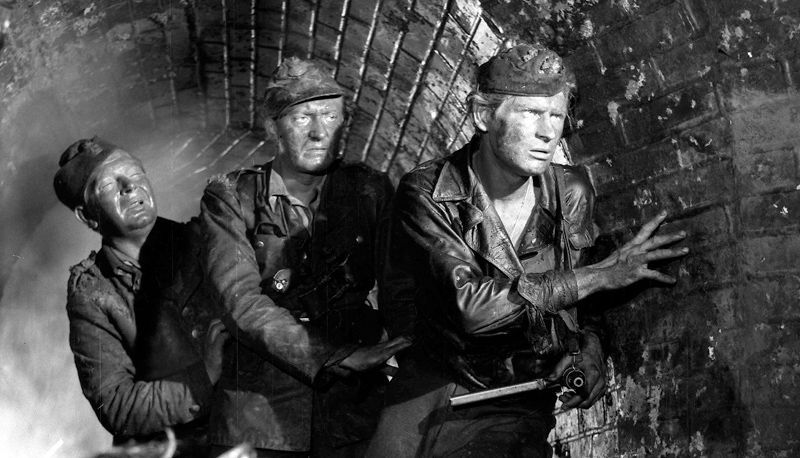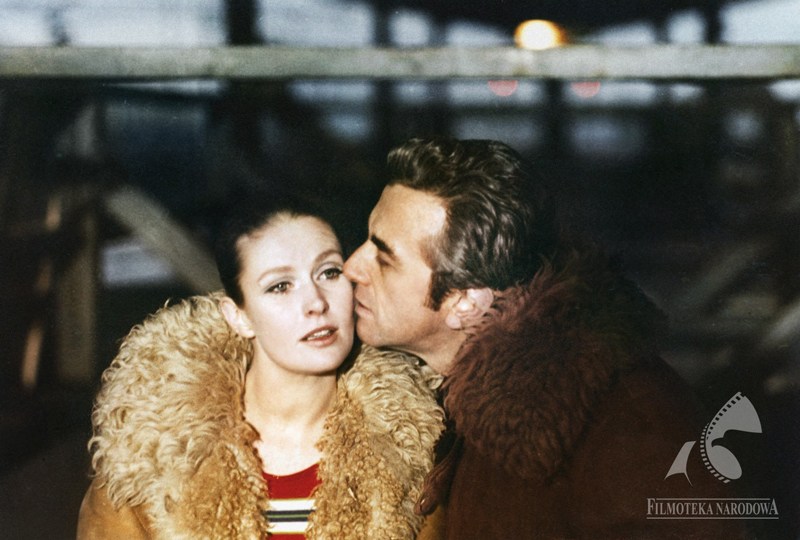7 Powerful Films by Andrzej Wajda
In 2000, Andrzej Wajda received an Honorary Academy Award 'in recognition of five decades of extraordinary film direction'. His films famously challenged the communist system, exposing its corrupting flaws, and presented the lives of people entangled in the chaos of history in such captivating ways. Here are some of Wajda's most powerful films.
Canal
 Still from Canal by Andrzej Wajda, 1956, photo: Polfilm
Still from Canal by Andrzej Wajda, 1956, photo: PolfilmThe story of Canal begins in Mokotów, a district of Warsaw, on 25th September 1944 – the fifty-sixth day of the Warsaw Uprising. The Uprising will shortly fail after sixty-three days of fighting. After a decimated insurgent detachment makes a failed attempt to break away from the German troops' encirclement, Zadra, their commander, orders them to get through the sewers to the city centre where the fighting is still going on. The group moves through the dark, winding underground system which is half filled with water and excrement, while the Germans stand guard at manholes ready to throw grenades. The scene in which Stokrotka and the wounded Korab reach the manhole exiting into the Wisła river only to find it is barred is one of the most famous scenes of Polish cinema.
Ashes and Diamonds
Andrzej Wajda’s next film, Ashes and Diamonds, together with his debut Generation (1955) and Canal (1956), constituted a part of a ‘powerful trilogy which examined the effects of war on Poland's youth’, to quote Jane Fonda, who presented Wajda with an honorary Oscar in 2000. Based on a novel by Jerzy Andrzejewski, the film, set in the last days of World War II, tells the story of two former Home Army soldiers, now fighting in an anti-communist resistance movement. On a mission to assassinate a local communist leader, the two men reminisce about their fallen comrades and wonder about their own future after the fighting ends.
Innocent Sorcerers
Innocent Sorcerers was Wajda's first film that didn't address wartime history. A story of three restless young and restless people of the jazz age, the movie’s style resembles French New Wave. The eponymous innocent sorcerers (the expression was taken from Adam Mickiewicz’s Dziady) are people of various professions who share a common lifestyle: evenings at trendy Warsaw bars, a love for jazz, and an aversion to any commitments. Wajda treats the carefree, post-war generation with reserve – he is distrustful of the modern lifestyle, but he doesn’t fall into shallow moralising. All in all, his characters are quite likeable and their ironic strategy of survival is nothing more than an answer to the changing social conditions. The movie is accompanied by a beautiful score composed by Krzysztof Komeda.
Everything for Sale
 Still from Everything for Sale by Andrzej Wajda, 1968, pictured: Beata Tyszkiewicz and Andrzej Łapicki, photo: Studio Filmowe Zebra / Filmoteka Narodowa/www.fototeka.fn.org.pl
Still from Everything for Sale by Andrzej Wajda, 1968, pictured: Beata Tyszkiewicz and Andrzej Łapicki, photo: Studio Filmowe Zebra / Filmoteka Narodowa/www.fototeka.fn.org.plThe film was conceived as homage to Zbigniew Cybulski, the tragically deceased actor who starred in several of Wajda's films, including Ashes and Diamonds and Innocent Sorcerers. The plot unravels on a meta level: a film's main lead doesn't show up on the set and a search for the missing actor begins. How can one break through the aura of mystery that surrounded the actor? What was real and what was only a legend? The ‘investigation’ led by the crew does not give any satisfactory answers, and the borders between the facts and the myths seem fluent and unclear. Mixing different narrative layers, Wajda shows how hard it is to separate life from cinema and the real world from the world of fiction.
Picture display
standardowy [760 px]
Still from Andrzej Wajda's 'The Promised Land', photo: Polfilm / East News
The Promised Land, one of Wajda's top cinematic achievements, brought the director his first Oscar nomination. Based on a novel by Władysław Reymont, the film is set in Łódź at the end of the 19th century: the eponymous ‘promised land’ and the capital of the flourishing textile industry. Three unlikely friends: Polish nobleman and engineer Karol Borowiecki, Jewish independent businessman Moritz Welt, and Max Baum, German heir to an old factory owner, want to build their own textile factory. Due to intricate intrigues and the ruthless conditions of raw industrial capitalism, their plans go awry. As important as the three men is the city – a multicultural urban jungle at the centre of important social changes, where the only common language is profit.
Katyń
After 1989, Wajda started working on the script of Katyń, which he finished only in 2007. The film deals with the mass murder of Polish officers by the NKVD in April and May 1940, a part of Stalin’s deliberate plan to wipe out the Polish intelligentsia. A taboo topic under the communist censors, the Katyń crime was never properly investigated. The plot of the film is set after the war. A Polish officer's mother, wife, and daughter await his return from a POW camp. Worried by his lengthening absence, they decide to start a search. Katyń is one of Wajda’s most personal films, as the director’s father was murdered in the Katyń Forest.
Sources: Culture.pl, edited by OK, 3 March 2016
[{"nid":"5688","uuid":"6aa9e079-0240-4dcb-9929-0d1cf55e03a5","type":"article","langcode":"en","field_event_date":"","title":"Challenges for Polish Prose in the Nineties","field_introduction":"Content: Depict the world, oneself and the form | The Mimetic Challenge: seeking the truth, destroying and creating myths | Seeking the Truth about the World | Destruction of the Heroic Emigrant Myth | Destruction of the Polish Patriot Myth | Destruction of the Flawless Democracy Myth | Creation of Myths | Biographical challenge | Challenges of genre | Summary\r\n","field_summary":"Content: Depict the world, oneself and the form | The Mimetic Challenge: seeking the truth, destroying and creating myths | Seeking the Truth about the World | Destruction of the Heroic Emigrant Myth | Destruction of the Polish Patriot Myth | Destruction of the Flawless Democracy Myth | Creation of Myths | Biographical challenge | Challenges of genre | Summary","topics_data":"a:2:{i:0;a:3:{s:3:\u0022tid\u0022;s:5:\u002259609\u0022;s:4:\u0022name\u0022;s:26:\u0022#language \u0026amp; literature\u0022;s:4:\u0022path\u0022;a:2:{s:5:\u0022alias\u0022;s:27:\u0022\/topics\/language-literature\u0022;s:8:\u0022langcode\u0022;s:2:\u0022en\u0022;}}i:1;a:3:{s:3:\u0022tid\u0022;s:5:\u002259644\u0022;s:4:\u0022name\u0022;s:8:\u0022#culture\u0022;s:4:\u0022path\u0022;a:2:{s:5:\u0022alias\u0022;s:14:\u0022\/topic\/culture\u0022;s:8:\u0022langcode\u0022;s:2:\u0022en\u0022;}}}","field_cover_display":"default","image_title":"","image_alt":"","image_360_auto":"\/sites\/default\/files\/styles\/360_auto\/public\/2018-04\/jozef_mroszczak_forum.jpg?itok=ZsoNNVXJ","image_260_auto":"\/sites\/default\/files\/styles\/260_auto_cover\/public\/2018-04\/jozef_mroszczak_forum.jpg?itok=pLlgriOu","image_560_auto":"\/sites\/default\/files\/styles\/560_auto\/public\/2018-04\/jozef_mroszczak_forum.jpg?itok=0n3ZgoL3","image_860_auto":"\/sites\/default\/files\/styles\/860_auto\/public\/2018-04\/jozef_mroszczak_forum.jpg?itok=ELffe8-z","image_1160_auto":"\/sites\/default\/files\/styles\/1160_auto\/public\/2018-04\/jozef_mroszczak_forum.jpg?itok=XazO3DM5","field_video_media":"","field_media_video_file":"","field_media_video_embed":"","field_gallery_pictures":"","field_duration":"","cover_height":"991","cover_width":"1000","cover_ratio_percent":"99.1","path":"en\/node\/5688","path_node":"\/en\/node\/5688"}]